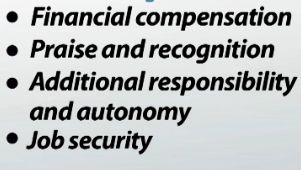Equity Theory of Motivation: Reward & Effort - Quiz
Choose your answer and write the correct one down. Then click HERE for the answers to this quiz.
NOTE: The transcript from the video is listed below the quiz for your reference.
1. He was a workplace and behavioral psychologist who developed equity theory in 1963.
- Victor Vroom
- John Smith
- E.L. Thorndike
- John Stacey Adams
- Clayton Alderfer
2. Equity theory is concerned with achieving balance between
- job satisfaction and training.
- managers and subordinates.
- knowledge and application.
- inputs and outputs.
- workforce skills and formal education.
3. Effort and enthusiasm, skills and abilities, flexibility and adaptability, and loyalty and commitment to the organization are examples of
- inputs.
- outputs.
- bargaining tools.
- attributes.
- contributions.
4. Financial compensation, praise and recognition, additional responsibility and autonomy, job security, and a sense of career advancement or personal growth are examples of
- inputs.
- outputs.
- bargaining tools.
- attributes.
- contributions.
5. Inequities in rewards can lead to all of the following except
- lower levels of job satisfaction.
- low employee morale.
- deviant workplace behavior.
- performance problems.
- increased employee morale.
Have you ever noticed that some employees seem to work harder than others for the same reward? Why does that happen? This lesson explains how equity theory is used by managers to motivate employees by providing a high reward for equivalent efforts on part of the employee.
You Scratch My Back and I'll Scratch Yours
In the United States we have a saying: 'You scratch my back and I'll scratch yours.' Even if you've never heard this phrase before, you can probably guess that it means that if you do something for me, I will in turn do something equal for you. It is a matter of fairness, which is something that most people want out of many aspects of life. This is certainly true in the business world. Most people look for a job that rewards them for what they can offer the organization, meaning we all want to be adequately compensated for our skills, abilities, knowledge and loyalty that we bring to a job. Being rewarded in this way seems fair, but unfortunately, this is not always achieved. When unfair treatment rears its ugly head in the workplace, so do a lack of motivation, lower performance and decreased job satisfaction.
 |
Equity Theory
A very simplistic yet logical theory of workplace motivation was developed by John Stacey Adams, a workplace and behavioral psychologist, in 1963. Equity theory is based on the premise that employees will put forth a particular level of effort that they feel compares to the reward potential. It comes down to a straightforward formula of inputs must equal outputs.
Inputs refer to things like:
- effort and enthusiasm
- skills and abilities
- flexibility and adaptability
- loyalty and commitment to the organization
Outputs include things such as:
- financial compensation
- praise and recognition
- additional responsibility and autonomy
- job security
- a sense of career advancement or personal growth
 |
The Perception of Inequality
According to equity theory, employees expect to be adequately rewarded for their efforts. They also expect to be rewarded in the same way that other employees are, meaning if a potential reward is offered to one employee for a particular level of productivity, that same reward should be offered to any other employee who puts forth the level of effort required to earn that reward. Inequalities in rewards can lead to lower levels of job satisfaction, deviant workplace behavior and low employee morale and can cause performance problems that negatively impact the entire organization.
 |
- ask for more equitable treatment
- look for ways to make their efforts look greater by comparison
- put in a lower level of effort
- look for a new position within the company or even quit entirely to seek out employment at a more equitable organization
Managers must work to eliminate or minimize these issues surrounding inequality when rewards are being allocated. Communication is key. Effective managers recognize their role in making sure employees understand the connection between performance and rewards before letting equality concerns become problematic for employees and the organization as a whole.
 |
Lesson Summary
Let's review. A very simplistic yet logical theory of workplace motivation was developed by John Stacey Adams called equity theory. Equity theory is based on the premise that employees will put forth a particular level of effort that they feel compares to the potential reward. It comes down to a straightforward formula of inputs must be equal to outputs. When a balance is achieved between inputs and outputs, it is believed that an employee will be more satisfied and willing to work toward higher levels of productivity. When a reward is perceived as equitable to the level of effort that they must exert, positive outcomes and high levels of motivation should be the expected result.
Employees also expect to be rewarded in the same way that other employees are. Inequalities in rewards can lead to lower levels of job satisfaction, deviant workplace behavior and low employee morale and can cause performance problems that impact the entire organization. However, effective managers understand their role in making sure employees understand the connection between performance and rewards before letting equality concerns become problematic for employees and the organization as a whole.